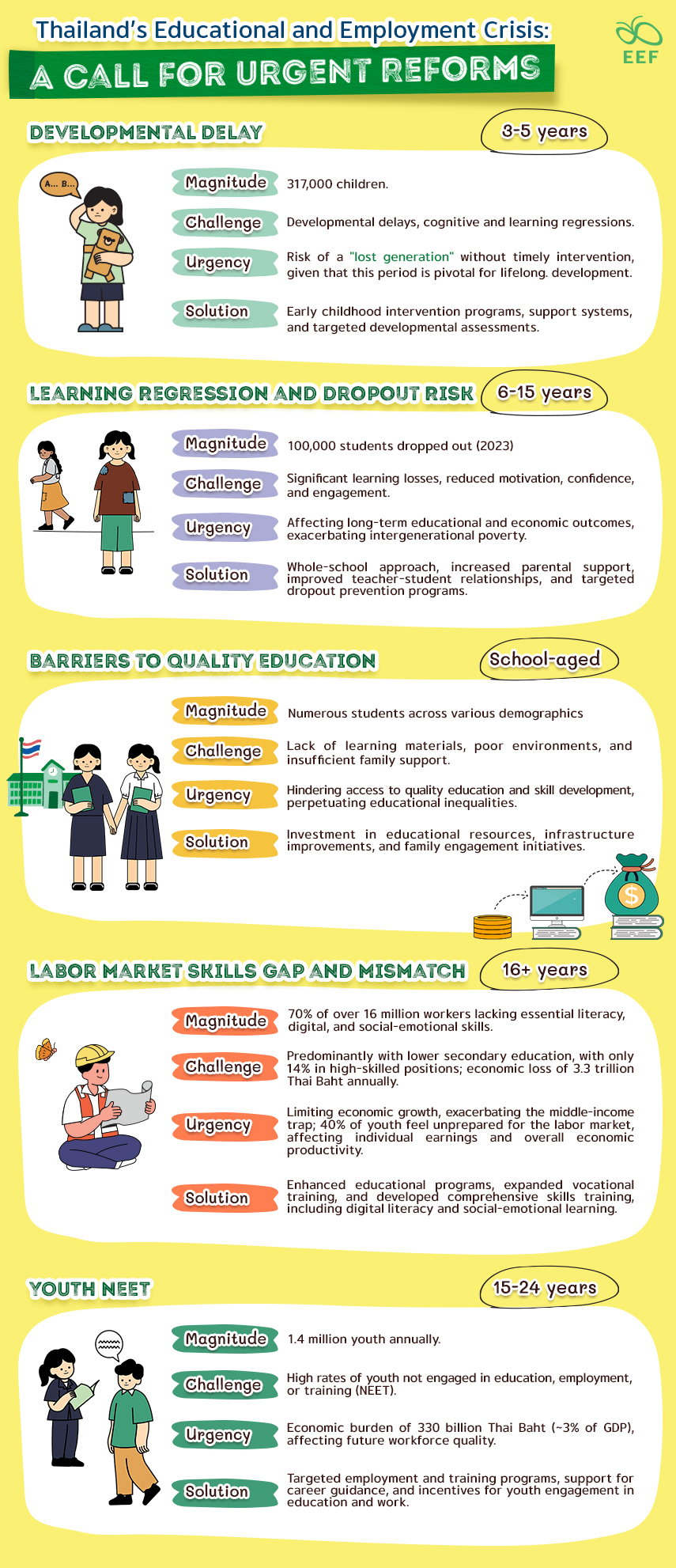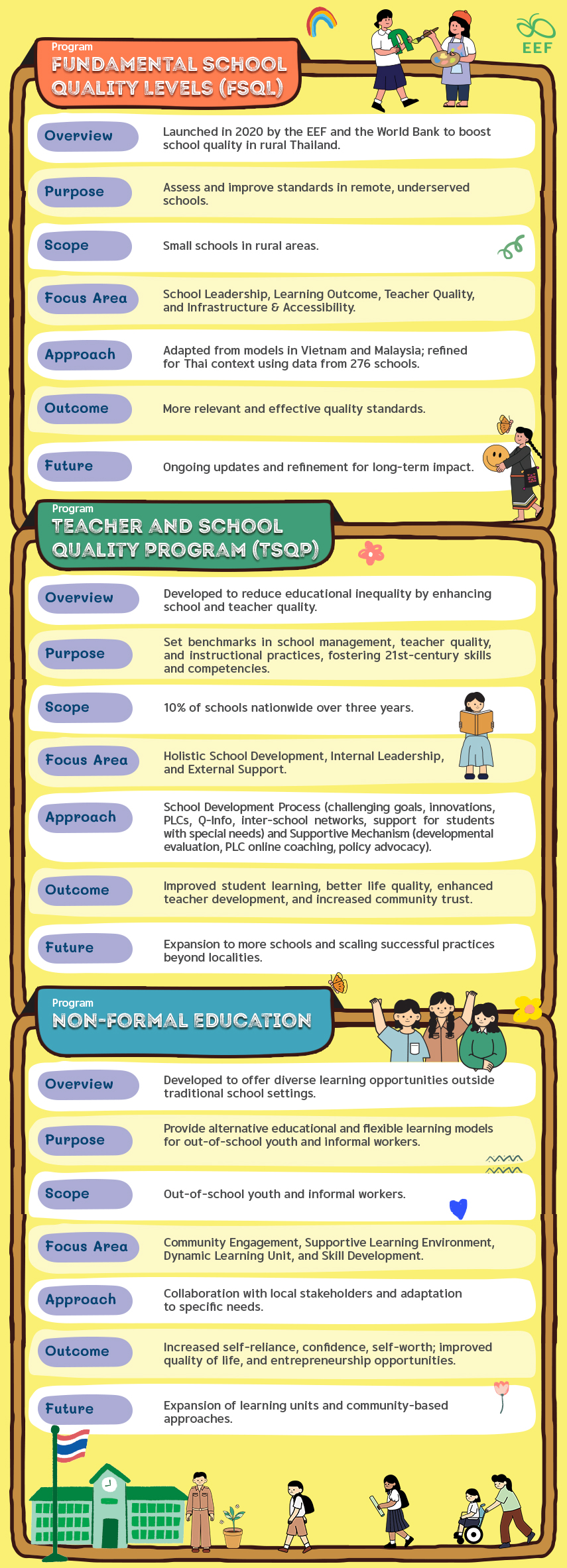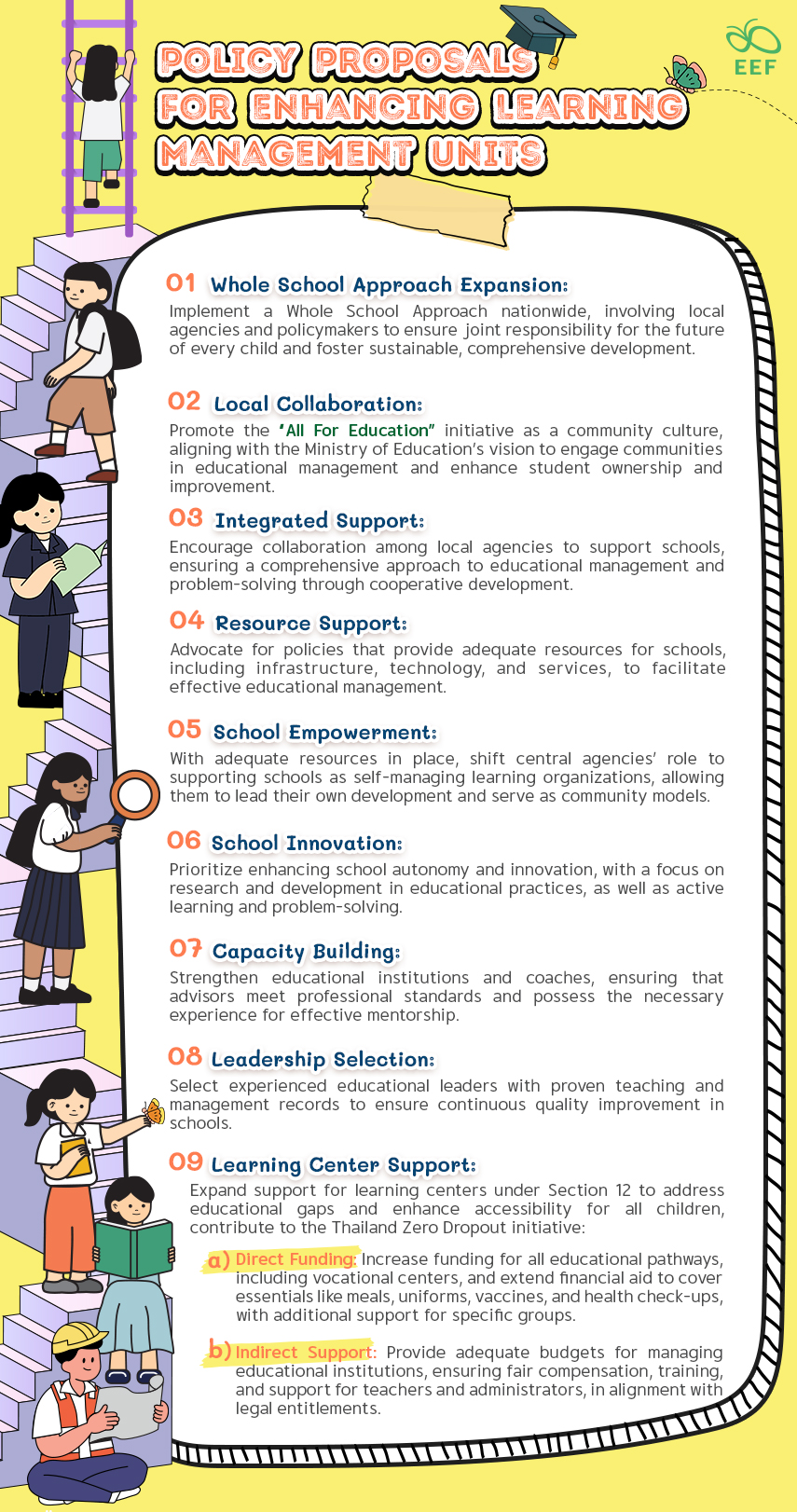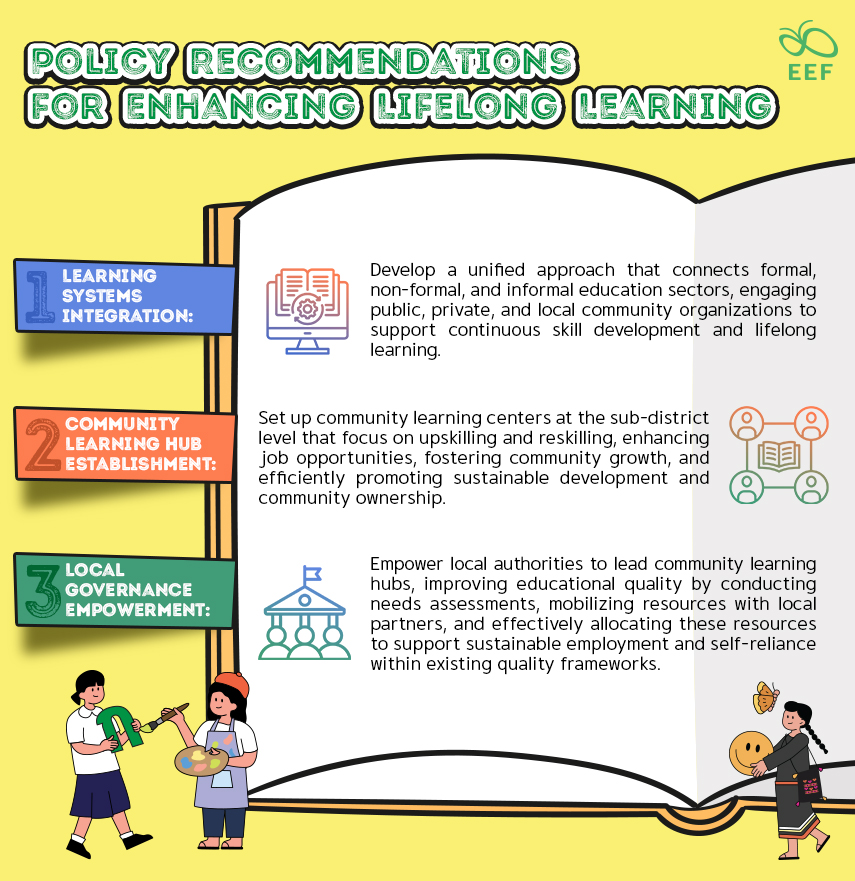
Thailand’s education system is buckling under the weight of lasting economic stagnation and the lingering fallout of the pandemic. Concentrated economic growth in urban centers has exacerbated household debt already mounting by the minute, placing 1.8 million children and youth from underprivileged families at increased risk of dropping out, a challenge that has intensified as the economy struggles post-COVID-19. Barriers like inadequate materials, poor learning environments, and insufficient family support further widen learning disparities from early childhood through school years. These disparities hinder essential skill development needed for the workforce, ultimately perpetuating intergenerational poverty and stifling human capital growth — key factors in escaping the middle-income trap. Thus, enhancing educational outcomes becomes crucial for national development.

Yet in 2023, over 317,000 children aged 3-5 faced developmental delays exacerbated by the pandemic, raising concerns about a potential “lost generation” without timely intervention. For students aged 6-15, the pandemic caused significant learning losses in key subjects, accompanied by declines in confidence, engagement, and well-being due to reduced motivation, poor parental support, and strained teacher-student relationships. By the first semester of 2023, 100,000 students, primarily from the lowest 15% of households and transitional grades, had dropped out. At-risk groups include those in poverty, from broken families, with learning disabilities, or facing bullying. A whole-school approach is essential to address these challenges. At the same time, Thailand’s labor market reflects similar challenges, with a workforce of over 16 million largely educated only to lower secondary level and only 14% employed in high-skilled positions. A significant 70% of workers lack literacy, digital, and social-emotional skills, resulting in an annual economic loss of 3.3 trillion Thai Baht. Improving these skills is crucial for boosting earnings and escaping the middle-income trap, potentially boosting individual earnings by 6,700 Thai Baht per month. Additionally, 1.4 million youth aged 15-24 are NEET, costing 330 billion Thai Baht or about 3% of GDP. Alarmingly, a recent survey reveals that 40% of youth aged 10-25 feel unprepared for the labor market, highlighting the urgent need for comprehensive reforms in education and training to meet evolving market demands.
Thailand’s Educational and Employment Crisis: A Call for Urgent Reforms

In the face of these challenges, 21st-century learning management has shifted to equip individuals for a complex, rapidly changing world, moving beyond traditional teacher-centric models. This modern approach underscores the vital roles of educational institutions and community learning centers, integrating them into a comprehensive educational ecosystem. Central to this transformation is the support for lifelong learning, encompassing learners, social supporters such as teachers and parents, learning environments like homes and schools, and policy-making bodies. The Equitable Education Fund (EEF) Thailand, in collaboration with various partners, aims to enhance these learning management units, becoming a pivotal force in both formal and informal education, with a focus on three key areas of capacity-building. The Fundamental School Quality Level (FSQL) Program evaluates school quality, using data from 276 remote schools to ensure content validity and set benchmarks for monitoring school standards. The Teacher and School Quality Program (TSQP) seeks to improve school management, teacher quality, and instructional practices across 10% of schools nationwide, promoting holistic development through community involvement and internal support mechanisms. The Non-Formal Education Program, on the other hand, offers flexible learning opportunities tailored to the needs of out-of-school youth and informal workers, fostering skill development and self-sufficiency through dynamic learning units and local collaborations and thereby promoting long-term improvements in living standards, entrepreneurship, and active citizenship.

To ensure the development of a resilient and equitable educational system, it is crucial to implement comprehensive strategies that prioritize learning management and lifelong learning support. These strategies must empower communities while reinforcing local governance to ensure access to essential resources and opportunities for every learner’s success — a success that depends on collaborative and integrated approaches to create a cohesive educational framework. Addressing current challenges within this framework drives continuous improvement and innovation, ultimately elevating the quality of education. This elevated quality, in turn, fuels sustainable community development, bridging gaps and laying the foundation for a more inclusive and prosperous society. To this end, the Equitable Education Fund (EEF) Thailand has put forward Policy Proposals for Enhancing Learning Management Units, alongside Policy Recommendations for Supporting Lifelong Learning, aimed at addressing these pressing challenges.

Policy Proposals for Enhancing Learning Management Units
- Whole School Approach Expansion: Implement a Whole School Approach nationwide, involving local agencies and policymakers to ensure joint responsibility for the future of every child and foster sustainable, comprehensive development;
- Local Collaboration: Promote the “All For Education” initiative as a community culture, aligning with the Ministry of Education’s vision to engage communities in educational management and enhance student ownership and improvement;
- Integrated Support: Encourage collaboration among local agencies to support schools, ensuring a comprehensive approach to educational management and problem-solving through cooperative development;
- Resource Support: Advocate for policies that provide adequate resources for schools, including infrastructure, technology, and services, to facilitate effective educational management;
- School Empowerment: With adequate resources in place, shift central agencies’ role to supporting schools as self-managing learning organizations, allowing them to lead their own development and serve as community models;
- School Innovation: Prioritize enhancing school autonomy and innovation, with a focus on research and development in educational practices, as well as active learning and problem-solving.
- Capacity Building: Strengthen educational institutions and coaches, ensuring that advisors meet professional standards and possess the necessary experience for effective mentorship;
- Leadership Selection: Select experienced educational leaders with proven teaching and management records to ensure continuous quality improvement in schools;
- Learning Center Support: Expand support for learning centers under Section 12 to address educational gaps and enhance accessibility for all children, contribute to the Thailand Zero Dropout initiative:
- Direct Funding: Increase funding for all educational pathways, including vocational centers, and extend financial aid to cover essentials like meals, uniforms, vaccines, and health check-ups, with additional support for specific groups;
- Indirect Support: Provide adequate budgets for managing educational institutions, ensuring fair compensation, training, and support for teachers and administrators, in alignment with legal entitlements.

Policy Recommendations for Enhancing Lifelong Learning
- Learning Systems Integration: Develop a unified approach that connects formal, non-formal, and informal education sectors, engaging public, private, and local community organizations to support continuous skill development and lifelong learning;
- Community Learning Hub Establishment: Set up community learning centers at the sub-district level that focus on upskilling and reskilling, enhancing job opportunities, fostering community growth, and efficiently promoting sustainable development and community ownership;
- Local Governance Empowerment: Empower local authorities to lead community learning hubs, improving educational quality by conducting needs assessments, mobilizing resources with local partners, and effectively allocating these resources to support sustainable employment and self-reliance within existing quality frameworks.
The challenges confronting Thailand’s educational system underscore the urgent need for comprehensive reforms that integrate innovative learning management strategies with a robust focus on lifelong learning. Central to this effort is the recognition of the interconnectedness of educational outcomes and economic development, where the well-being of vulnerable youth and the readiness of the workforce to meet market demands play pivotal roles. By enhancing the quality of education through targeted initiatives such as the Equitable Education Fund (EEF) Thailand’s holistic programs — a mission perfectly encapsulated by the EEF, which aims to reduce education inequality through research, collaboration, and support for children, youth, and adults in need — Thailand seeks to bridge existing disparities, foster essential skills, and empower communities. This multi-faceted approach not only addresses immediate educational needs but also lays the groundwork for sustainable development, enabling individuals to transcend the cycle of poverty while contributing meaningfully to national growth.

Addressing these challenges paves the way for Thailand to emerge as a leader in educational reform, setting a benchmark for equitable and inclusive learning environments. Aligning educational strategies with the evolving demands of the labor market cultivates a skilled workforce poised to drive economic advancement. This transformation uplifts the current generation of learners and ensures that future generations inherit a resilient educational framework. As Thailand fosters a culture of lifelong learning and community collaboration, it creates the potential for a prosperous society where every child can thrive, contributing to a dynamic and inclusive economy.

